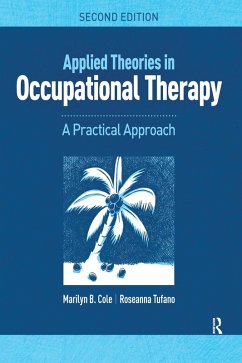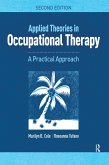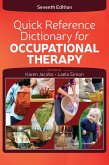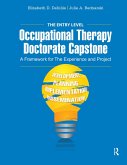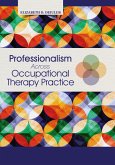Marilyn B. Cole, Roseanna Tufano
Applied Theories in Occupational Therapy (eBook, ePUB)
A Practical Approach
62,95 €
62,95 €
inkl. MwSt.
Sofort per Download lieferbar

31 °P sammeln
62,95 €
Als Download kaufen

62,95 €
inkl. MwSt.
Sofort per Download lieferbar

31 °P sammeln
Jetzt verschenken
Alle Infos zum eBook verschenken
62,95 €
inkl. MwSt.
Sofort per Download lieferbar
Alle Infos zum eBook verschenken

31 °P sammeln
Marilyn B. Cole, Roseanna Tufano
Applied Theories in Occupational Therapy (eBook, ePUB)
A Practical Approach
- Format: ePub
- Merkliste
- Auf die Merkliste
- Bewerten Bewerten
- Teilen
- Produkt teilen
- Produkterinnerung
- Produkterinnerung

Bitte loggen Sie sich zunächst in Ihr Kundenkonto ein oder registrieren Sie sich bei
bücher.de, um das eBook-Abo tolino select nutzen zu können.
Hier können Sie sich einloggen
Hier können Sie sich einloggen
Sie sind bereits eingeloggt. Klicken Sie auf 2. tolino select Abo, um fortzufahren.

Bitte loggen Sie sich zunächst in Ihr Kundenkonto ein oder registrieren Sie sich bei bücher.de, um das eBook-Abo tolino select nutzen zu können.
Applied Theories in Occupational Therapy: A Practical Approach, Second Edition provides a system-based, comprehensive overview of the theories, models, and frames of reference that influence occupational therapy around the world.
- Geräte: eReader
- ohne Kopierschutz
- eBook Hilfe
- Größe: 10MB
Andere Kunden interessierten sich auch für
![Applied Theories in Occupational Therapy (eBook, PDF) Applied Theories in Occupational Therapy (eBook, PDF)]() Marilyn B. ColeApplied Theories in Occupational Therapy (eBook, PDF)62,95 €
Marilyn B. ColeApplied Theories in Occupational Therapy (eBook, PDF)62,95 €![Quick Reference Dictionary for Occupational Therapy (eBook, ePUB) Quick Reference Dictionary for Occupational Therapy (eBook, ePUB)]() Karen JacobsQuick Reference Dictionary for Occupational Therapy (eBook, ePUB)59,95 €
Karen JacobsQuick Reference Dictionary for Occupational Therapy (eBook, ePUB)59,95 €![The Entry Level Occupational Therapy Doctorate Capstone (eBook, ePUB) The Entry Level Occupational Therapy Doctorate Capstone (eBook, ePUB)]() Elizabeth DeiuliisThe Entry Level Occupational Therapy Doctorate Capstone (eBook, ePUB)70,95 €
Elizabeth DeiuliisThe Entry Level Occupational Therapy Doctorate Capstone (eBook, ePUB)70,95 €![Occupational and Activity Analysis (eBook, ePUB) Occupational and Activity Analysis (eBook, ePUB)]() Heather ThomasOccupational and Activity Analysis (eBook, ePUB)65,95 €
Heather ThomasOccupational and Activity Analysis (eBook, ePUB)65,95 €![Group Dynamics in Occupational Therapy (eBook, ePUB) Group Dynamics in Occupational Therapy (eBook, ePUB)]() Marilyn B. ColeGroup Dynamics in Occupational Therapy (eBook, ePUB)79,95 €
Marilyn B. ColeGroup Dynamics in Occupational Therapy (eBook, ePUB)79,95 €![Professionalism Across Occupational Therapy Practice (eBook, ePUB) Professionalism Across Occupational Therapy Practice (eBook, ePUB)]() Elizabeth DeiuliisProfessionalism Across Occupational Therapy Practice (eBook, ePUB)59,95 €
Elizabeth DeiuliisProfessionalism Across Occupational Therapy Practice (eBook, ePUB)59,95 €![Occupational Therapy in Australia (eBook, ePUB) Occupational Therapy in Australia (eBook, ePUB)]() Occupational Therapy in Australia (eBook, ePUB)37,95 €
Occupational Therapy in Australia (eBook, ePUB)37,95 €-
-
-
Applied Theories in Occupational Therapy: A Practical Approach, Second Edition provides a system-based, comprehensive overview of the theories, models, and frames of reference that influence occupational therapy around the world.
Dieser Download kann aus rechtlichen Gründen nur mit Rechnungsadresse in A, B, BG, CY, CZ, D, DK, EW, E, FIN, F, GR, HR, H, IRL, I, LT, L, LR, M, NL, PL, P, R, S, SLO, SK ausgeliefert werden.
Produktdetails
- Produktdetails
- Verlag: Taylor & Francis eBooks
- Erscheinungstermin: 1. Juni 2024
- Englisch
- ISBN-13: 9781040142158
- Artikelnr.: 70885398
- Verlag: Taylor & Francis eBooks
- Erscheinungstermin: 1. Juni 2024
- Englisch
- ISBN-13: 9781040142158
- Artikelnr.: 70885398
- Herstellerkennzeichnung Die Herstellerinformationen sind derzeit nicht verfügbar.
Marilyn B. (Marli) Cole, MS, OTR/L, FAOTA, is an occupational therapy Professor Emerita at Quinnipiac University in Hamden, Connecticut. She is the author of Group Dynamics in Occupational Therapy, now in its fifth edition (SLACK Incorporated, 2018). Marli also coauthored textbooks on social participation (with Mary Donohue, 2011) and productive aging (with Karen Macdonald, 2015) and coedited Global Perspectives in Professional Reasoning (with Jennifer Creek, 2016), all published by SLACK Incorporated. A graduate of University of Pennsylvania, she practiced for 16 years in mental health, pediatrics, and geriatrics. She holds an advanced certification in sensory integration and has published chapters on theory development, client-centered groups, occupational therapy in retirement, volunteering, end of life, theories of aging, and occupational therapy in the third age (retirement). As an educator, she taught courses in therapeutic use of self, group leadership, frames of reference, psychopathology, geriatrics, group dynamics, evaluation, intervention, health conditions, problem-based learning, and research. As a fieldwork I coordinator, she developed student experiences in the United States, England, Costa Rica, and Australia. In 2011, she guest-edited a special edition of Occupational Therapy International on occupational therapy in the third age. Marli regularly presents at professional conferences, including the American Occupational Therapy Association (AOTA), the World Federation of Occupational Therapy, the Geriatric Society of America (GSA), and the International Positive Psychology Association (IPPA). At home in Stratford, Connecticut or Freeport, Bahamas, Marli and husband Martin Schiraldi enjoy traveling, cruising, sailing, hiking, biking, snorkeling, and fostering rescue dogs.
Roseanna Tufano, LMFT, OTR/L, is a Clinical Professor of Occupational Therapy at Quinnipiac University. Since graduating with an occupational therapy degree in 1980, she has worked along a continuum of mental health services. Her teaching career at Quinnipiac University began in 1984, and she has taught courses primarily in occupational therapy theory development, health conditions/psychopathology, group dynamics, clinical reasoning, psychosocial adaptation to physical disorders, and mental health assessments and interventions across the lifespan. She has published several chapters on related topics and has presented locally and nationally for 3 decades. With her advanced degree in family therapy, Roseanna joins her husband Lou in a private practice called Enduring Families conducting individual, couple, marital, and family therapy. She recently served a 6-year term as Chair of the Board for a nonprofit mental health agency. Within the Quinnipiac University community, she advises and engages actively with students and has received several awards. Roseanna has been an invited motivational speaker for various student activities, including the Freshman Address at the University Convocation, where her daughter, Carissa, sat among the incoming class of 2006. Roseanna and Lou enjoy traveling, dancing, and spending family time with adult children Carissa and Brett, who were both married in 2017.
Roseanna Tufano, LMFT, OTR/L, is a Clinical Professor of Occupational Therapy at Quinnipiac University. Since graduating with an occupational therapy degree in 1980, she has worked along a continuum of mental health services. Her teaching career at Quinnipiac University began in 1984, and she has taught courses primarily in occupational therapy theory development, health conditions/psychopathology, group dynamics, clinical reasoning, psychosocial adaptation to physical disorders, and mental health assessments and interventions across the lifespan. She has published several chapters on related topics and has presented locally and nationally for 3 decades. With her advanced degree in family therapy, Roseanna joins her husband Lou in a private practice called Enduring Families conducting individual, couple, marital, and family therapy. She recently served a 6-year term as Chair of the Board for a nonprofit mental health agency. Within the Quinnipiac University community, she advises and engages actively with students and has received several awards. Roseanna has been an invited motivational speaker for various student activities, including the Freshman Address at the University Convocation, where her daughter, Carissa, sat among the incoming class of 2006. Roseanna and Lou enjoy traveling, dancing, and spending family time with adult children Carissa and Brett, who were both married in 2017.
Dedication v About the Authors ix Preface xi Section I: Applied Theories of
Health and Wellness Chapter 1. Current Trends: Occupational Therapy's
Visions for the Future The American Occupational Therapy Association's
Centennial Visions Trends From the Slagle Lectures and AOTA's Official
Documents The Evolution of Occupational Therapy Paradigm Shifts in 20th
Century Occupational Therapy Theoretical History of Occupational Therapy
Learning Activities Chapter 2. Models of Health and Wellness The Medical
Approach to Continuums of Care The Biopsychosocial Model A Global
Perspective: The World Health Organization's Model The Recovery Model in
Mental Health A Client-Centered Model of Health Care Public Health Models
of Health Care Wilcock's Occupational Perspective of Health Learning
Activities Chapter 3. The New Paradigm of Occupation Occupation as a Core
Concept Systems Theory Social Cognitive Theory Future Directions for
Occupational Therapy Learning Activities Chapter 4. Organization of Theory
in Occupational Therapy What Is Theory? Levels of Theory Contributions of
Occupational Science Occupation-Based Models Frames of Reference How to
Evaluate Models and Frames of Reference Learning Activities Section II:
Occupation-Based Models Chapter 5. Occupational Behavior Chapter 6. Model
of Human Occupation Chapter 7. The
Person-Environment-Occupation-Performance Model Chapter 8. Occupational
Adaptation Chapter 9. Ecology of Human Performance Chapter 10.
International Models: Person-Environment-Occupation, Canadian Model of
Occupational Performance, and Japanese Kawa Chapter 11. Model Integration
Section III: Frames of Reference Chapter 12. Applied Behavioral Frames
Chapter 13. Cognitive Behavioral Frames Chapter 14. Social Cognition and
Third Wave Cognitive Frames of Reference Chapter 15. Biomechanical and
Rehabilitative Frames Chapter 16. Allen's Cognitive Levels Frame of
Reference Chapter 17. Toglia's Dynamic Interactional Approach Chapter 18.
Ayres' Sensory Integration Frame Chapter 19. Sensory Motor and Processing
Frames Chapter 20. Motor Control Frames Chapter 21. Motor Learning and
Task-Oriented Frames Chapter 22. Psychoanalytic Frames Chapter 23.
Psychodynamic-Ego-Adaptive Frames Chapter 24. Frames of Reference
Integration Appendix 1. Theories of Lifespan Development Appendix 2. An
Existential/Humanistic Approach Index
Health and Wellness Chapter 1. Current Trends: Occupational Therapy's
Visions for the Future The American Occupational Therapy Association's
Centennial Visions Trends From the Slagle Lectures and AOTA's Official
Documents The Evolution of Occupational Therapy Paradigm Shifts in 20th
Century Occupational Therapy Theoretical History of Occupational Therapy
Learning Activities Chapter 2. Models of Health and Wellness The Medical
Approach to Continuums of Care The Biopsychosocial Model A Global
Perspective: The World Health Organization's Model The Recovery Model in
Mental Health A Client-Centered Model of Health Care Public Health Models
of Health Care Wilcock's Occupational Perspective of Health Learning
Activities Chapter 3. The New Paradigm of Occupation Occupation as a Core
Concept Systems Theory Social Cognitive Theory Future Directions for
Occupational Therapy Learning Activities Chapter 4. Organization of Theory
in Occupational Therapy What Is Theory? Levels of Theory Contributions of
Occupational Science Occupation-Based Models Frames of Reference How to
Evaluate Models and Frames of Reference Learning Activities Section II:
Occupation-Based Models Chapter 5. Occupational Behavior Chapter 6. Model
of Human Occupation Chapter 7. The
Person-Environment-Occupation-Performance Model Chapter 8. Occupational
Adaptation Chapter 9. Ecology of Human Performance Chapter 10.
International Models: Person-Environment-Occupation, Canadian Model of
Occupational Performance, and Japanese Kawa Chapter 11. Model Integration
Section III: Frames of Reference Chapter 12. Applied Behavioral Frames
Chapter 13. Cognitive Behavioral Frames Chapter 14. Social Cognition and
Third Wave Cognitive Frames of Reference Chapter 15. Biomechanical and
Rehabilitative Frames Chapter 16. Allen's Cognitive Levels Frame of
Reference Chapter 17. Toglia's Dynamic Interactional Approach Chapter 18.
Ayres' Sensory Integration Frame Chapter 19. Sensory Motor and Processing
Frames Chapter 20. Motor Control Frames Chapter 21. Motor Learning and
Task-Oriented Frames Chapter 22. Psychoanalytic Frames Chapter 23.
Psychodynamic-Ego-Adaptive Frames Chapter 24. Frames of Reference
Integration Appendix 1. Theories of Lifespan Development Appendix 2. An
Existential/Humanistic Approach Index
Dedication v About the Authors ix Preface xi Section I: Applied Theories of
Health and Wellness Chapter 1. Current Trends: Occupational Therapy's
Visions for the Future The American Occupational Therapy Association's
Centennial Visions Trends From the Slagle Lectures and AOTA's Official
Documents The Evolution of Occupational Therapy Paradigm Shifts in 20th
Century Occupational Therapy Theoretical History of Occupational Therapy
Learning Activities Chapter 2. Models of Health and Wellness The Medical
Approach to Continuums of Care The Biopsychosocial Model A Global
Perspective: The World Health Organization's Model The Recovery Model in
Mental Health A Client-Centered Model of Health Care Public Health Models
of Health Care Wilcock's Occupational Perspective of Health Learning
Activities Chapter 3. The New Paradigm of Occupation Occupation as a Core
Concept Systems Theory Social Cognitive Theory Future Directions for
Occupational Therapy Learning Activities Chapter 4. Organization of Theory
in Occupational Therapy What Is Theory? Levels of Theory Contributions of
Occupational Science Occupation-Based Models Frames of Reference How to
Evaluate Models and Frames of Reference Learning Activities Section II:
Occupation-Based Models Chapter 5. Occupational Behavior Chapter 6. Model
of Human Occupation Chapter 7. The
Person-Environment-Occupation-Performance Model Chapter 8. Occupational
Adaptation Chapter 9. Ecology of Human Performance Chapter 10.
International Models: Person-Environment-Occupation, Canadian Model of
Occupational Performance, and Japanese Kawa Chapter 11. Model Integration
Section III: Frames of Reference Chapter 12. Applied Behavioral Frames
Chapter 13. Cognitive Behavioral Frames Chapter 14. Social Cognition and
Third Wave Cognitive Frames of Reference Chapter 15. Biomechanical and
Rehabilitative Frames Chapter 16. Allen's Cognitive Levels Frame of
Reference Chapter 17. Toglia's Dynamic Interactional Approach Chapter 18.
Ayres' Sensory Integration Frame Chapter 19. Sensory Motor and Processing
Frames Chapter 20. Motor Control Frames Chapter 21. Motor Learning and
Task-Oriented Frames Chapter 22. Psychoanalytic Frames Chapter 23.
Psychodynamic-Ego-Adaptive Frames Chapter 24. Frames of Reference
Integration Appendix 1. Theories of Lifespan Development Appendix 2. An
Existential/Humanistic Approach Index
Health and Wellness Chapter 1. Current Trends: Occupational Therapy's
Visions for the Future The American Occupational Therapy Association's
Centennial Visions Trends From the Slagle Lectures and AOTA's Official
Documents The Evolution of Occupational Therapy Paradigm Shifts in 20th
Century Occupational Therapy Theoretical History of Occupational Therapy
Learning Activities Chapter 2. Models of Health and Wellness The Medical
Approach to Continuums of Care The Biopsychosocial Model A Global
Perspective: The World Health Organization's Model The Recovery Model in
Mental Health A Client-Centered Model of Health Care Public Health Models
of Health Care Wilcock's Occupational Perspective of Health Learning
Activities Chapter 3. The New Paradigm of Occupation Occupation as a Core
Concept Systems Theory Social Cognitive Theory Future Directions for
Occupational Therapy Learning Activities Chapter 4. Organization of Theory
in Occupational Therapy What Is Theory? Levels of Theory Contributions of
Occupational Science Occupation-Based Models Frames of Reference How to
Evaluate Models and Frames of Reference Learning Activities Section II:
Occupation-Based Models Chapter 5. Occupational Behavior Chapter 6. Model
of Human Occupation Chapter 7. The
Person-Environment-Occupation-Performance Model Chapter 8. Occupational
Adaptation Chapter 9. Ecology of Human Performance Chapter 10.
International Models: Person-Environment-Occupation, Canadian Model of
Occupational Performance, and Japanese Kawa Chapter 11. Model Integration
Section III: Frames of Reference Chapter 12. Applied Behavioral Frames
Chapter 13. Cognitive Behavioral Frames Chapter 14. Social Cognition and
Third Wave Cognitive Frames of Reference Chapter 15. Biomechanical and
Rehabilitative Frames Chapter 16. Allen's Cognitive Levels Frame of
Reference Chapter 17. Toglia's Dynamic Interactional Approach Chapter 18.
Ayres' Sensory Integration Frame Chapter 19. Sensory Motor and Processing
Frames Chapter 20. Motor Control Frames Chapter 21. Motor Learning and
Task-Oriented Frames Chapter 22. Psychoanalytic Frames Chapter 23.
Psychodynamic-Ego-Adaptive Frames Chapter 24. Frames of Reference
Integration Appendix 1. Theories of Lifespan Development Appendix 2. An
Existential/Humanistic Approach Index
